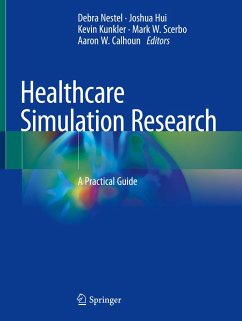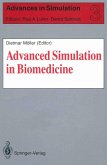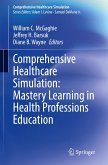Healthcare Simulation Research
A Practical Guide
Herausgegeben:Nestel, Debra; Hui, Joshua; Kunkler, Kevin; Scerbo, Mark W.; Calhoun, Aaron W.
Healthcare Simulation Research
A Practical Guide
Herausgegeben:Nestel, Debra; Hui, Joshua; Kunkler, Kevin; Scerbo, Mark W.; Calhoun, Aaron W.
- Broschiertes Buch
- Merkliste
- Auf die Merkliste
- Bewerten Bewerten
- Teilen
- Produkt teilen
- Produkterinnerung
- Produkterinnerung
This book provides readers with a detailed orientation to healthcare simulation research, aiming to provide descriptive and illustrative accounts of healthcare simulation research (HSR). Written by leaders in the field, chapter discussions draw on the experiences of the editors and their international network of research colleagues. This seven-section practical guide begins with an introduction to the field by relaying the key components of HSR. Sections two, three, four, and five then cover various topics relating to research literature, methods for data integration, and qualitative and…mehr
Andere Kunden interessierten sich auch für
![Pocket Book for Simulation Debriefing in Healthcare Pocket Book for Simulation Debriefing in Healthcare]() Denis OriotPocket Book for Simulation Debriefing in Healthcare27,99 €
Denis OriotPocket Book for Simulation Debriefing in Healthcare27,99 €![Dynamic Modeling Dynamic Modeling]() Bruce HannonDynamic Modeling82,99 €
Bruce HannonDynamic Modeling82,99 €![Advanced Simulation in Biomedicine Advanced Simulation in Biomedicine]() Advanced Simulation in Biomedicine41,99 €
Advanced Simulation in Biomedicine41,99 €![Comprehensive Healthcare Simulation: Mastery Learning in Health Professions Education Comprehensive Healthcare Simulation: Mastery Learning in Health Professions Education]() Comprehensive Healthcare Simulation: Mastery Learning in Health Professions Education97,99 €
Comprehensive Healthcare Simulation: Mastery Learning in Health Professions Education97,99 €![Simulation in Healthcare Education Simulation in Healthcare Education]() Harry OwenSimulation in Healthcare Education75,99 €
Harry OwenSimulation in Healthcare Education75,99 €![The Essential Handbook of Healthcare Simulation The Essential Handbook of Healthcare Simulation]() Paul O'ConnorThe Essential Handbook of Healthcare Simulation143,99 €
Paul O'ConnorThe Essential Handbook of Healthcare Simulation143,99 €![Faculty Health in Academic Medicine Faculty Health in Academic Medicine]() Faculty Health in Academic Medicine75,99 €
Faculty Health in Academic Medicine75,99 €-
-
-
This book provides readers with a detailed orientation to healthcare simulation research, aiming to provide descriptive and illustrative accounts of healthcare simulation research (HSR). Written by leaders in the field, chapter discussions draw on the experiences of the editors and their international network of research colleagues. This seven-section practical guide begins with an introduction to the field by relaying the key components of HSR. Sections two, three, four, and five then cover various topics relating to research literature, methods for data integration, and qualitative and quantitative approaches. Finally, the book closes with discussions of professional practices in HSR, as well as helpful tips and case studies.Healthcare Simulation Research: A Practical Guide is an indispensable reference for scholars, medical professionals and anyone interested in undertaking HSR.
Produktdetails
- Produktdetails
- Verlag: Springer / Springer International Publishing / Springer, Berlin
- Artikelnr. des Verlages: 978-3-030-26836-7
- 1st edition 2019
- Seitenzahl: 388
- Erscheinungstermin: 25. November 2019
- Englisch
- Abmessung: 279mm x 210mm x 20mm
- Gewicht: 1134g
- ISBN-13: 9783030268367
- ISBN-10: 3030268365
- Artikelnr.: 57018646
- Herstellerkennzeichnung Die Herstellerinformationen sind derzeit nicht verfügbar.
- Verlag: Springer / Springer International Publishing / Springer, Berlin
- Artikelnr. des Verlages: 978-3-030-26836-7
- 1st edition 2019
- Seitenzahl: 388
- Erscheinungstermin: 25. November 2019
- Englisch
- Abmessung: 279mm x 210mm x 20mm
- Gewicht: 1134g
- ISBN-13: 9783030268367
- ISBN-10: 3030268365
- Artikelnr.: 57018646
- Herstellerkennzeichnung Die Herstellerinformationen sind derzeit nicht verfügbar.
Debra Nestel, PhD FSSH Professor Monash Institute for Health & Clinical Education, Monash University Department of Surgery, University of Melbourne Victoria Australia Joshua Hui, MD, MS, MHA Associate Physician Kaiser Permanente Los Angeles Medical Center Emergency Department Los Angeles, CA USA Kevin Kunkler, MD Professor Texas Christian Univ. and Univ. of North Texas Health Science Center School of Medicine Department of Educational Affairs Fort Worth, TX USA Mark W. Scerbo, PhD, FSSH, FHFES Professor Department of Psychology Old DominionUniversity Norfolk, VA USA Aaron W. Calhoun, MD, FAAP, FSSH Professor Department of Pediatrics, University of Louisville School of Medicine and Norton Children's Hospital Louisville, KY USA
Section I. Introduction to Healthcare Simulation Research .- Ch 1: Developing expertise in healthcare simulation research.- Ch 2: A contemporary history of healthcare simulation research.- Ch 3: Programs of research in healthcare simulation.- Ch 4: Starting your research project: from problem to theory to question.- Ch 5: Overview of serious gaming and virtual reality.- Ch 6: Overview of computational modeling and simulation.- Section II. Finding and Making Use of Existing Literature.- Ch 7: Seeking, reviewing and reporting on healthcare simulation research.- Ch 8: Systematic and nonsystematic reviews: choosing an approach.- Section III. Qualitative Approaches in Healthcare Simulation Research.- Ch 9: Introduction to qualitative research in healthcare simulation.- Ch 10: Key concepts in qualitative research design.- Ch 11: Refining your qualitative approach in healthcare simulation research.- Ch 12: In-depth interviews.- Ch 13: Focus groups in healthcare simulation research.- Ch 14: Observational methods in simulation research .- Ch 15: Visual methods in simulation-based research.- Ch 16: Survey and other textual data.- Ch 17: Transcription and data management.- Ch 18: Grounded theory methodology: key principles.- Ch 19: Analyzing data: approaches to thematic analysis.- Ch 20: Naturally occurring data: conversation, discourse, and hermeneutic analysis.- Section IV. Quantitative Approaches in Healthcare Simulation Research.- Ch 21: Quantitative research in healthcare simulation - an introduction and discussion of common pitfalls.- Ch 22: Research and hypothesis testing - moving from theory to experiment.- Ch 23: Designing quantitative research studies.- Ch 24: Outcome measures and data.- Ch 25: Designing, choosing, and using assessment tools in healthcare simulation research.- Ch 26: Reliability and validity.- Ch 27: Statistical analysis: getting to insight through collaboration and critical thinking.- Ch 28: Nonparametric tests used in simulation research.- Ch 29: Contemporary analysis of simulation-based research data: P values, statistical power, and effect size.- Ch 30: Advanced statistical analyses.- Section V. Mixed Methods and Data Integration.- Ch 31: Applying mixed methods research to healthcare simulation.- Ch 32: Making use of diverse data sources in healthcare simulation research.- Section VI. Professional Practices in Healthcare Simulation Research.- Ch 33: Writing a research proposal for sponsorship or funding.- Ch 34: Writing an ethics application.- 35: Strategies in developing a simulation research proposal.- Ch 36: Identifying and applying for funding.- Ch 37: Anatomy of a successful grant proposal.- Ch 38: Establishing and maintaining multicenter studies in healthcare simulation research.- Ch 39: Supervision in healthcare simulation research: creating rich experiences.- Ch 40: Project management in healthcare simulation research.- Ch 41: Disseminating healthcare simulation research.- Ch 42: Writing for publication.- Ch 43: Peer review for publications: a guide for reviewers .- Section VII. Getting Started in Healthcare Simulation Research: Tips and Case Studies .- Ch 44: Unpacking the social dimensions of research - how to get started in healthcare simulation research.- Ch 45: Case Study 1: Joining the research conversation: the romance and reality.- Ch 46: Case Study 2: Discovering qualitative research.- Ch 47: Case Study 3: Application of quantitative methodology.- Ch 48: Case Study 4: Navigating the peer review process in healthcare simulation: a doctoral student's perspective.
Section I. Introduction to Healthcare Simulation Research .- Ch 1: Developing expertise in healthcare simulation research.- Ch 2: A contemporary history of healthcare simulation research.- Ch 3: Programs of research in healthcare simulation.- Ch 4: Starting your research project: from problem to theory to question.- Ch 5: Overview of serious gaming and virtual reality.- Ch 6: Overview of computational modeling and simulation.- Section II. Finding and Making Use of Existing Literature.- Ch 7: Seeking, reviewing and reporting on healthcare simulation research.- Ch 8: Systematic and nonsystematic reviews: choosing an approach.- Section III. Qualitative Approaches in Healthcare Simulation Research.- Ch 9: Introduction to qualitative research in healthcare simulation.- Ch 10: Key concepts in qualitative research design.- Ch 11: Refining your qualitative approach in healthcare simulation research.- Ch 12: In-depth interviews.- Ch 13: Focus groups in healthcare simulation research.- Ch 14: Observational methods in simulation research .- Ch 15: Visual methods in simulation-based research.- Ch 16: Survey and other textual data.- Ch 17: Transcription and data management.- Ch 18: Grounded theory methodology: key principles.- Ch 19: Analyzing data: approaches to thematic analysis.- Ch 20: Naturally occurring data: conversation, discourse, and hermeneutic analysis.- Section IV. Quantitative Approaches in Healthcare Simulation Research.- Ch 21: Quantitative research in healthcare simulation - an introduction and discussion of common pitfalls.- Ch 22: Research and hypothesis testing - moving from theory to experiment.- Ch 23: Designing quantitative research studies.- Ch 24: Outcome measures and data.- Ch 25: Designing, choosing, and using assessment tools in healthcare simulation research.- Ch 26: Reliability and validity.- Ch 27: Statistical analysis: getting to insight through collaboration and critical thinking.- Ch 28: Nonparametric tests used in simulation research.- Ch 29: Contemporary analysis of simulation-based research data: P values, statistical power, and effect size.- Ch 30: Advanced statistical analyses.- Section V. Mixed Methods and Data Integration.- Ch 31: Applying mixed methods research to healthcare simulation.- Ch 32: Making use of diverse data sources in healthcare simulation research.- Section VI. Professional Practices in Healthcare Simulation Research.- Ch 33: Writing a research proposal for sponsorship or funding.- Ch 34: Writing an ethics application.- 35: Strategies in developing a simulation research proposal.- Ch 36: Identifying and applying for funding.- Ch 37: Anatomy of a successful grant proposal.- Ch 38: Establishing and maintaining multicenter studies in healthcare simulation research.- Ch 39: Supervision in healthcare simulation research: creating rich experiences.- Ch 40: Project management in healthcare simulation research.- Ch 41: Disseminating healthcare simulation research.- Ch 42: Writing for publication.- Ch 43: Peer review for publications: a guide for reviewers .- Section VII. Getting Started in Healthcare Simulation Research: Tips and Case Studies .- Ch 44: Unpacking the social dimensions of research - how to get started in healthcare simulation research.- Ch 45: Case Study 1: Joining the research conversation: the romance and reality.- Ch 46: Case Study 2: Discovering qualitative research.- Ch 47: Case Study 3: Application of quantitative methodology.- Ch 48: Case Study 4: Navigating the peer review process in healthcare simulation: a doctoral student's perspective.








